Measure Twice: How to Use a Caliper For Reloading
Precision is everything in the world of reloading. Whether you’re tailoring loads for peak accuracy or ensuring the utmost safety in each round, calipers are a fundamental part of the process. An essential tool for any reloader, this article breaks down how to property use and read calipers.
In this guide, we’ll break down using calipers, compare vernier, dial and digital versions, highlight common use cases for reloaders, and explain why precision a caliper helps you measure matters. We’ll also showcase the RCBS Electronic Caliper as a standout choice trusted by both beginners and seasoned handloaders.
Calipers are precision measuring tools used to measure the dimensions of an object. Typically length, width, depth, as well as internal and external diameters (inside diameter ID & outside diameter or OD, respectively.)
Common Uses for Calipers in Reloading
- Checking case length: Cases which are too long may get unintentionally crimped by the chamber causing pressure spikes. Wondering when to trim your case? The first step is accurately measuring your case body’s length with an accurate set of calipers.
- Measuring cartridge overall length (COAL/OAL): Bullets seated too deep may cause pressure spikes due to a reduction in case volume, and bullets not seated far enough could cause bullets to be forced into the rifling upon chambering, causing failure to feed. Additionally, dialing in the right COAL or OAL will help you achieve better accuracy from your rounds by customizing ideal bullet seating depth for your given firearm and load.
- Measuring shoulder bump or headspace (with adapters): Ensures the shoulder of the case has been “bumped” back far enough allow for reliable feeding. Getting an ideal case resize helps reduce the work, or wear and tear, on your case, giving you more reloads and better case life – saving money and maintaining accuracy.
Vernier vs. Dial vs. Digital Calipers: Key Differences
Vernier Calipers
- Manual readout via vernier scale
- No electronics or moving dials
- Most affordable option
- Steeper learning curve for reading measurements accurately
Dial Calipers
- Manual readout using a mechanical dial and gear mechanism instead of scale
- Easier to read than vernier calipers
- No batteries required
Digital or Electronic Calipers
- Digital readout for easy-to-read dimensions
- Switch between metric and imperial units with a button
- Offers zeroing function at any position for relative measurements
- Requires batteries
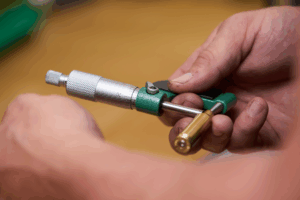
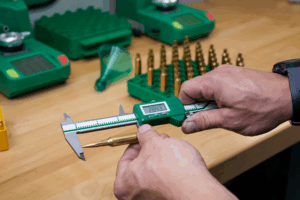
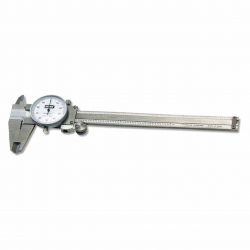
DIAL CALIPERS
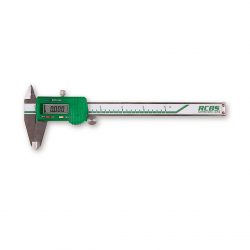
DIGITAL CALIPERS
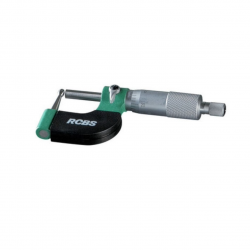
VERNIER CALIPERS
How to Properly Use and care for Calipers in Reloading
- Clean the Calipers: Close the jaws on a piece of paper and gently pull the paper out of the jaws.
- Zero the Calipers: Close the jaws fully and press the “zero” button.
- Measure Correctly: Apply gentle, consistent pressure. Over-squeezing can flex the jaws and skew measurements.
- Store Calipers in Case: Protects your calipers from dust and impact.
Highlight: RCBS Electronic Caliper
If you’re looking for a reliable, user-friendly caliper that delivers consistent performance, the RCBS Electronic Caliper is a top choice. Here’s why it stands out:
- Precision: Measures to 0.0005″ (or 0.01mm)
- Accuracy: ±0.001” (or 0.02mm)
- Large LCD Screen: Easy to read, even in low light
- Stainless Steel Build: Durable and corrosion-resistant
- Zero Function: Allows you to set relative measurements
- Battery Included: Ready to use out of the box
Final Thoughts
Calipers may seem like a small tool, but their role in reloading is massive. Whether you’re a casual shooter trying to tighten groups or a seasoned marksman dialing in match-grade rounds, accurate measurement is non-negotiable. A quality caliper like the RCBS Electronic Caliper simplifies that precision and ensures your hard work pays off where it counts: downrange.
Invest in the right tool, learn to use it well, and let precision guide your handloading success.
Share: